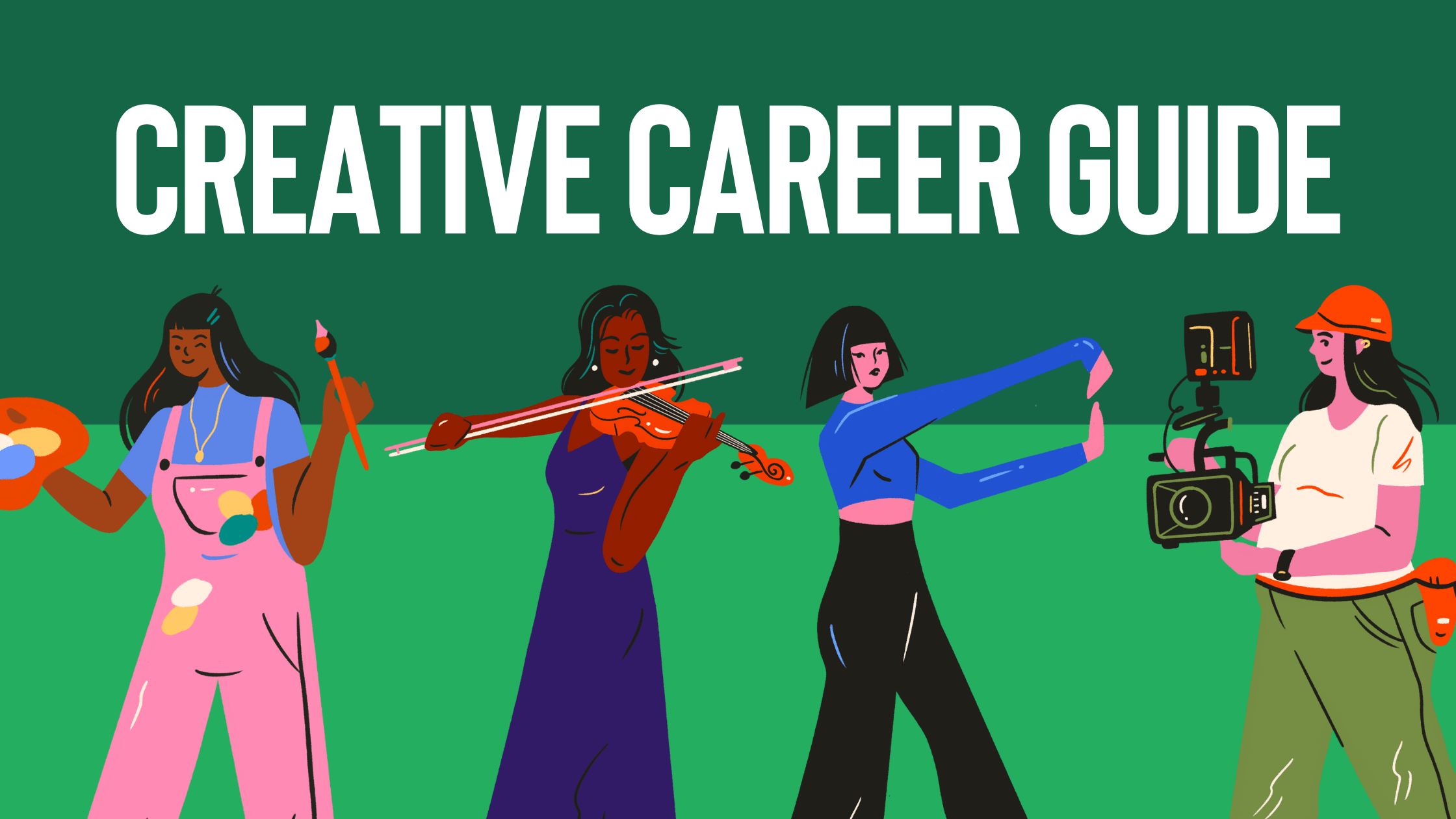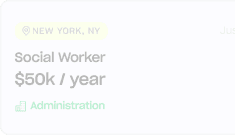

Heads up: This article may include affiliate links or sponsored content from brands and products we trust or actually use ourselves. Using them doesn’t cost you a thing, but it helps support our mission.
So many of us have been told the lie that says you can’t make money in the arts. That couldn’t be more wrong. Starting a creative career can actually be quite lucrative and emotionally rewarding.
According to our Salary Database of thousands of publicly shared salaries, top creative roles like creative directors, studio photographers, illustrators, product designers, and architects are making over $200,000 a year.
We found an architect making $1M in our database!
Driven by technological advancement, many salaries could also increase for certain roles due to fast-growing skills like design and user experience (UX), according to the Future of Jobs Report 2025 by the World Economic Forum.
Even with AI changing some aspects of the industry, there is still a ton of opportunity for newbies entering the field. The hype around AI misses the fact that AI will never have a human perspective. Art and creativity require human experience, something AI will never live or feel. Just remember that when everyone else is screaming that AI might take their jobs.
In this career guide, we’ll be breaking down different creative careers, including what they do, skills required, and where to start with online courses or art school programs. You’ll also learn the different salary expectations for each role using salary data recorded from real creative industry professionals in our Salary Database, our interviews, and other data sources like Glassdoor and the U.S. Bureau of Labor Statistics (BLS).
What is a Creative Career?
A creative career is any profession that requires expertise in the arts, media, design, or crafting areas. Jobs in the creative field emphasize creativity as a core value and not just a side skill. The value you bring to your role lies in your ideas, style, and taste.
To get a sneak peak into the different creative careers available, check out these recent video interviews we did with fellow creatives!
?
How to Choose Your Creative Career Path
As a creative person, you probably have several creative strengths and artistic paths you want to explore. To find the best fit, take into account your talents, lifestyle goals, and earning potential.
Start with these three questions:
- What is something that you want to do for 40 hours a week to express your unique talents and still make a comfortable living?
- What are your lifestyle goals?
- How much money do you want to make?
From there, experiment with a few ideas before you commit. Look up introduction-type online courses for fields you’re interested in and challenge yourself to try a side project or two. While you’re learning about different roles, also research their salaries and growth potential.
Also look for experts on LinkedIn that are already doing what you want to do. Follow them and get more of a feel for different roles and the current state of the industry. I also love this route because it shows you all of the different ways creative people structure their careers. Some work at a company or agency, others have their own businesses, and many do a combination of the two. There is no limit to what you can do.
Pro tip: Use our Salary Transparent Job Board as a tool to learn more about different roles and help make your decision. Reading about what’s required in current jobs hiring will give you a better understanding of what to expect and prepare for as you navigate your own career.
Breaking Down The Different Areas of The Creative Industry (& The Roles In Them)
The creative industry is a broad sector with two main types of roles: those that help to produce a creative product and those who help support it. For example, a fashion designer helps create a piece of clothing or accessory while the marketing and branding teams at that same company work to market and drive the success of the finished product.
There are also many sub-areas of the industry, such as digital media and audio that can also crossover into the tech world, and beauty that consists of independent creative trade jobs like nail and makeup artists.
Here are all of the different creative areas broken out (with links to more interviews):
- Visual arts: Illustrator, photographer, fine art (painter, sculptor), tattoo artist
- Digital media and content creation: UI/UX designer, video game designer, videographer, video producer/editor, animator, content creator
- Writing and publishing: Copywriter, content writer, UX writer, editor, screenwriter, content strategist/manager
- Marketing and branding: Art director, creative director, social media marketer, brand manager
- Performing arts: Actor, dancer, singer, voice actor, director
- Beauty: Nail artist, makeup artist, hair stylist
- Music and audio: Composer, sound designer, music producer, sound engineer, podcast producer, musician, DJ
- Fashion and product design: Fashion designer, product designer, fashion stylist
- Architecture and interior design: Architect, interior designer, set designer
- Crafts and makers: Ceramic artist, woodworker, textile artist
Let’s break down these 50 creative jobs even further, including what they do, what’s required, and how much they make. This list doesn’t represent every possible role in the creative industry but it’s a great starting point to spark ideas for your own career path.
Job Title | Role | Skills Needed | Entry-Level Education & Training | Salary |
| Illustrator | Creates hand-drawn or digital images for products and advertising. | Drawing, design, digital illustration tools (Adobe Illustrator, Procreate) | Bachelor’s in Illustration, Fine Arts, or equivalent portfolio | $46K - $250K |
| Photographer | Captures and edits images for clients. | Camera operation, composition, lighting, editing software (Lightroom, Photoshop) | Photography courses, bachelor’s in photography, or portfolio | $35K - $288K |
| Fine Artist (Painter, Sculptor) | Produces original artworks for galleries and clients. | Artistic technique, creative vision, material handling, self-promotion | Fine Arts degree or self-taught with strong portfolio | $56K - $98K+ |
| Tattoo Artist | Designs and applies permanent body art. | Drawing, precision, sanitation practices, customer service | Apprenticeship under licensed artist, state licensing | $54K - $92K+ |
| UI/UX Designer | Designs user interfaces and user experiences for apps, websites, and software. | Wireframing, prototyping, design tools (Figma, Sketch), user research | Bachelor’s in Design, or self-taught portfolio | $70K - $175K |
| Video Game Designer | Develops gameplay concepts and mechanics for video games. | Storytelling, coding basics, 3D modeling, game engines (Unity, Unreal) | Bachelor’s in Game Design, related field, or experience | $64K - $155K |
| Videographer | Shoots and edits video content for events, commercials, or digital platforms. | Camera work, lighting, editing software (Premiere Pro, Final Cut) | Film school, certificate programs, or portfolio | $57K - $106K |
| Video Producer/Editor | Plans, produces, and edits video content for clients or companies. | Project management, editing software, storytelling | Bachelor’s in Film/Media or equivalent experience | $54K - $180K |
| Animator | Creates animated sequences for film, games, or ads. | Storyboarding, animation software (After Effects, Blender) | Animation degree or self-taught portfolio | $72K - $120K+ |
| Content Creator | Produces original content (video, blogs, social media) for personal brands and clients. | Marketing, platform algorithms | No formal education required, but social media skills are essential | $30K - $150K+ |
| Copywriter | Writes copy for ads, marketing, and branding. | Writing, marketing strategy | Bachelor’s in English, Marketing, or experience | $45K - $100K+ |
| Content Writer | Writes for blogs, websites, and social media. | Research, SEO, writing | Bachelor’s or writing experience | $29K - $170K |
| UX Writer | Crafts microcopy and user-facing text for digital products. | Writing, UX principles | Bachelor’s in English, Communications, or portfolio | $63K - $125K |
| Editor | Reviews and revises written content. | Editing, attention to detail | Bachelor’s in English, Journalism, or related | $56K - $230K |
| Screenwriter | Writes scripts for movies, TV, and online productions. | Storytelling, dialogue writing, screenplay formatting | Film school or portfolio | $71K - $133K |
| Content Strategist | Plans and manages content to meet brand goals. | Writing, SEO, marketing, analytics | Bachelor’s in Marketing, Communications, or related | $60K - $200K |
| Art Director | Oversees the visual style of campaigns and publications. | Design, leadership, branding | Bachelor’s in Design, Advertising, or related | $58K - $150K+ |
| Creative Director | Guides overall creative vision for brands or projects. | Leadership, marketing strategy | Bachelor’s and extensive experience | $36K - $288K |
| Social Media Marketer | Plans marketing campaigns on social platforms. | Marketing, copywriting, analytics, trend tracking | Bachelor’s or self-taught | $38K - $145K |
| Brand Manager | Develops and maintains a brand’s image and strategy. | Marketing, communication, market research | Bachelor’s in Marketing or Business | $50K - $187K |
| Actor | Performs roles in film, television, theater, or commercials. | Acting techniques, memorization, improvisation | Drama school, acting classes | $58K - $108K+ |
| Dancer | Performs in stage productions, films, or events. | Dance technique, choreography | Dance school or conservatory | $64K - $120K+ |
| Singer | Performs music professionally live or in studio. | Vocal technique, music theory, stage presence | Music training or self-taught | $67K - $125K |
| Voice Actor | Provides voice work for animation, games, ads, or audiobooks. | Vocal control, acting, recording skills | Acting or voice-over training | $63K - $113K |
| Director | Oversees artistic vision of stage or film productions. | Leadership, storytelling, project management | Film school or industry experience | $83K - $152K+ |
| Nail Artist | Applies nail art and manicures. | Nail techniques, sanitation | Cosmetology program and license | $65K - $109K+ |
| Makeup Artist | Applies makeup for events, film, photography, or fashion. | Makeup techniques, color theory, skin care | Makeup school or cosmetology | $48K - $83+ |
| Hair Stylist | Cuts, styles, and treats hair for clients. | Hair techniques, customer service | Cosmetology program and license | $54K - $91K+ |
| Composer | Creates original music for performances and media. | Music theory, composition | Music degree or self-taught portfolio | $72K - $133K+ |
| Sound Designer | Creates and edits audio effects for media. | Audio editing, recording | Audio engineering degree or courses | $65K - $120K |
| Music Producer | Oversees creation and recording of music tracks. | Music production, mixing, collaboration | Music production courses or degree | $70K - $129K+ |
| Sound Engineer | Manages recording and mixing for audio. | Audio tech skills, mixing, equipment knowledge | Audio engineering school | $69K - $125K |
| Podcast Producer | Plans, records, and edits podcast episodes. | Audio editing, storytelling, marketing | No formal degree, portfolio preferred | $56K - $890K+ |
| Musician | Performs, composes, or records music across various genres. | Instrument proficiency, vocal ability, music theory | No degree required, self-taught portfolio/demo | $30K – $250K+ |
| DJ | Curates and performs music sets for events or radio. | Music mixing, crowd engagement, tech skills | No degree, DJ training helpful | $40K - $288K |
| Fashion Designer | Designs clothing and accessories for brands. | Sketching, sewing, trend research | Fashion design degree or self-taught portfolio | $64K - $120K |
| Product Designer | Designs consumer goods with form and function in mind. | 3D modeling, prototyping, market research | Industrial design degree | $23K - $300K |
| Fashion Stylist | Curates outfits for clients, photoshoots, or productions. | Fashion knowledge, styling, trend spotting | Fashion or styling courses | $62K - $115K |
| Architect | Designs buildings and oversees construction plans. | CAD, design, structural knowledge | Bachelor’s in Architecture, licensure | $29K - $1M |
| Interior Designer | Plans and decorates interior spaces. | Design, space planning, color theory | Interior design degree or certification | $49K - $120K |
| Set Designer | Designs scenery for theater, TV, or film. | Design, construction | Theater or design degree | $56K - $101K |
| Ceramic Artist | Creates pottery, sculpture, or decorative ceramic pieces. | Clay techniques, glazing | Art school or self-taught | $56K - $92K |
| Woodworker | Crafts furniture and decor with wood. | Carpentry, design, tool skills | Apprenticeship or self-taught | $38K - $55K+ |
| Textile Artist | Creates art from fabric, yarn, or fibers. | Weaving, dyeing, sewing | Art school or self-taught | $71K - $129K |
Head over to our Salary Database to view more salary data, education and experience demographics, and job information behind each salary.
How to Break In With or Without a Degree
With bachelor’s degrees being more expensive than ever, it’s great news to see that over 30 of these 50+ jobs DON’T require one. Many in the creative field take advantage of alternative pathways like online courses, specialized art schools, apprenticeships, and building strong portfolios to break in.
If you think online courses aren’t worth it and won’t help you get a creative job, let’s bust that myth right now. These are actually called microcredentials and are just as valuable on your resume as anything else. According to Forbes, 96% of American employers say these microcredentials strengthen your job application and may even help you land the job.
We recommend starting with the following courses and programs:
- Photography: Photography Basics and Beyond: From Smartphone to DSLR Specialization
- Illustration: How to Draw: A Beginner’s Guide Pt 1 – Basic Shapes
- Videography: The Art of Filmmaking: Composition and Moving Image
- Music production: Music Production Specialization by Berklee College
- UX design: Google UX Design Professional Certificate
- Game design and animation: Epic Games Game Design Professional Certificate
- Fashion design: Fashion as Design
- Writing: Creative Writing Specialization
- Script writing: Write a Pilot Episode for a TV or Web Series (Project-Centered Course)
- Content creation: Social Media Content and Strategy by Adobe
- Branding: Brand Management: Strategies for a Strong Brand
- Marketing: Google Digital Marketing & E-commerce Professional Certificate
- Architecture: Making Architecture
These courses are also helpful when wanting to pivot your career to a creative role. You can learn on your own time without having to attend anywhere in person. If you’re stuck trying to figure out how to exactly pivot, start with your transferable skills and build out from there.
For example, a software engineer may be able to pivot to video game design because of their transferable programming and problem-solving skills. Even though video game designers are not video game developers, programming powers video games. They understand how code works to effectively design and communicate their ideas.
Why You Should Build a Portfolio ASAP
The key to breaking into any creative role is a portfolio (or demo). A strong portfolio that showcases your skills and style says much more than any degree.
A creative portfolio is typically a website or digital space to house samples of past projects, showing your best work. Start building yours by putting together samples from mock projects, personal projects, and from any experience you have (including freelance projects!). When you’re going through any online learning, keep the work from the projects that are usually included. Then add those to your portfolio along with samples from mock projects. FakeClients is a great tool to use for mock project ideas.
To house your portfolio, choose a portfolio website maker like Canva, Behance/Adobe, Squarespace, or leverage your LinkedIn to add projects to your profile.
Use portfolio examples for inspiration when designing your own and choosing what to include:
- UX Designer: Max Marra
- Photographer: Tom Hull
- Video artist: Amelie Elmquist
- Digital artist: Isabel Mendes
- Architect: Angélica María Ruiz Forero
- Creative director: Brenna Hamilton
- More examples on Behance
Where to Find Jobs in The Creative Field
When you’re ready to start searching and applying for entry-level jobs, make sure you have an optimized resume to go along with your portfolio. Use a resume builder to help craft your professional resume.
Then start with the Salary Transparent Job Board that includes salary expectations for each job listing. Also use creative-focused job boards like Behance (perfect for portfolio exposure), Creatively, Uxcel (perfect for designers), and Dribbble (perfect for freelancers) – all of which list in-person, hybrid, and remote jobs.
Another useful way to find jobs or clients to work with as a freelancer is to join a creative directory like the one on ilovecreatives. There are also many professional communities open for creatives to join to find career opportunities and network with other creatives. A few of these include The Dots, Meetup for Creative Professionals, and The Professional Association for Design.
Even though it may seem that LinkedIn isn’t a central hub for creatives, it is. It’s a great resource for posting your work, connecting with other top creative professionals, and looking for jobs. This is also where recruiters surf for potential talent to reach out to.
If you want more hands-on experience as a complete newbie, look at opportunities at creative organizations like art galleries to learn more about the industry. We interviewed someone who works at an art gallery while also working at a photo lab that prints for the art gallery.
More Career Resources
If you leave this career guide with anything, I hope it’s this: The biggest factors that will help you start your creative career more than anything else are 1) self-starting with artistic experimentation and learning opportunities, 2) building a strong portfolio, and 3) talking to other people in the industry.
People are the most overlooked resource we have in our career. They’re the ones that may vouch for you behind closed doors and be there to confide in when times get rough. Many will also share their story about how they got to where they are and can have some hidden gems for tips to break into the industry.
Extrovert or introvert, do your best to put yourself out there and start connecting with other creatives. If you start anywhere, start there.
If you want to learn more about other careers, check out our other recent career guides:
Until next time, stay awesome, stay strong, and keep advocating for yourself no matter what! I’m Daniella, a former engineer who writes about tech, money, and careers, and a current member of the CNET Money Expert Review Board. I’m extremely passionate about workers' rights and financial freedom, so it’s a pleasure to be able to bring you this type of content through the Salary Transparent Street blog (thank you for the opportunity, Hannah!) You can also follow me on Linkedin. Chat soon!
If this guide helps you land a higher-paying job, let us know! Send us an email ➡️ hello@salarytransparentstreet.com
For more Salary Transparent Resources:
- Want to join the movement? Explore thousands of individually reported salaries nationwide across all industries in our Salary Database!
- Looking for a job? Start your job search on our salary transparent job board!
- Do you know if you're being underpaid? Take our free quiz to find out!
- Need help determining your market rate? Download our free Market Research Guide to learn what you should be making.
- Need help negotiating your salary? Download our free Salary Negotiation Guide!
- Follow us on TikTok, Instagram, Facebook, YouTube and LinkedIn for daily pay transparency interviews and career news you can use!
- Subscribe to our weekly newsletter for news updates, professional deep dives, learning opportunities, and more!


